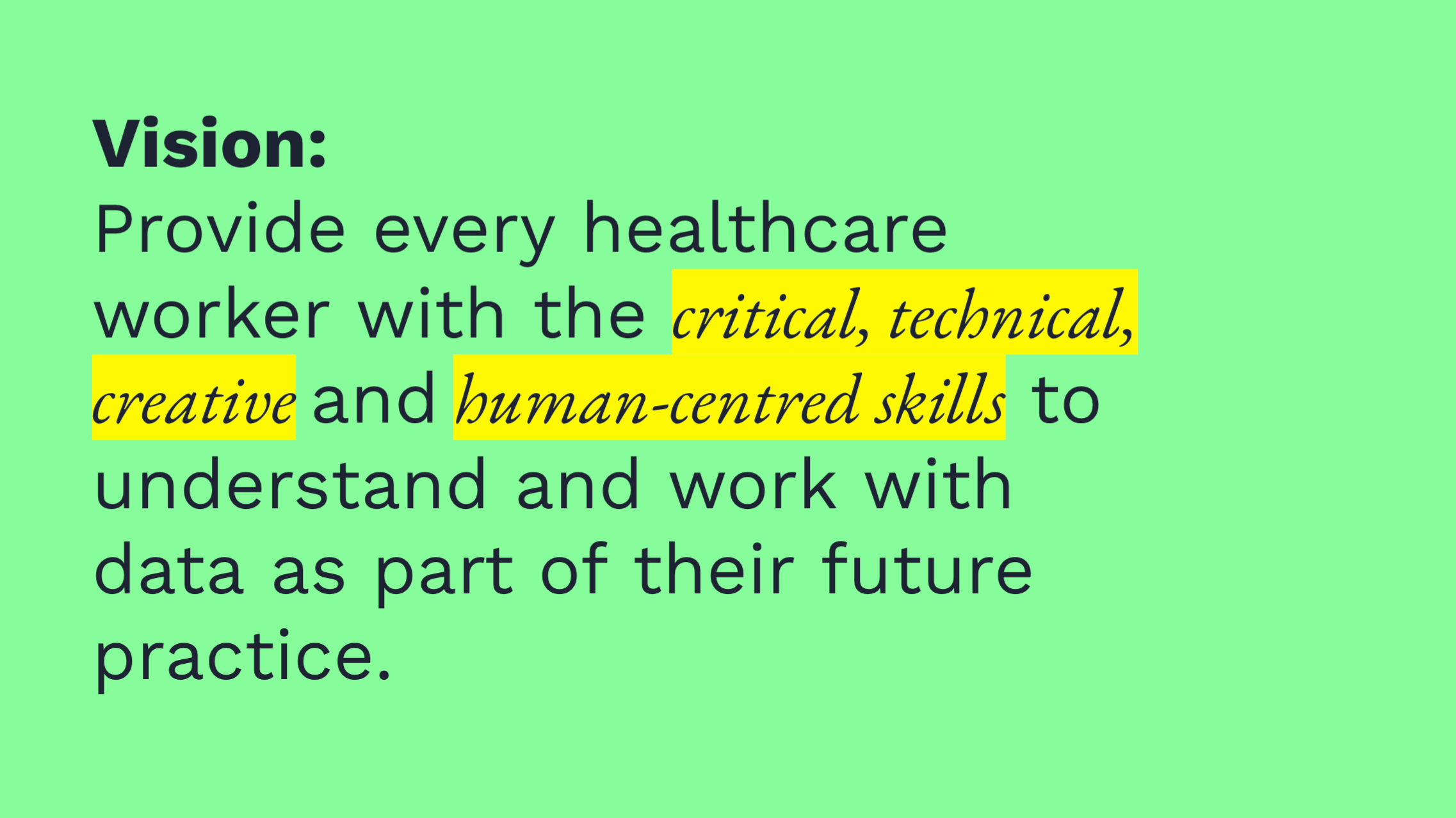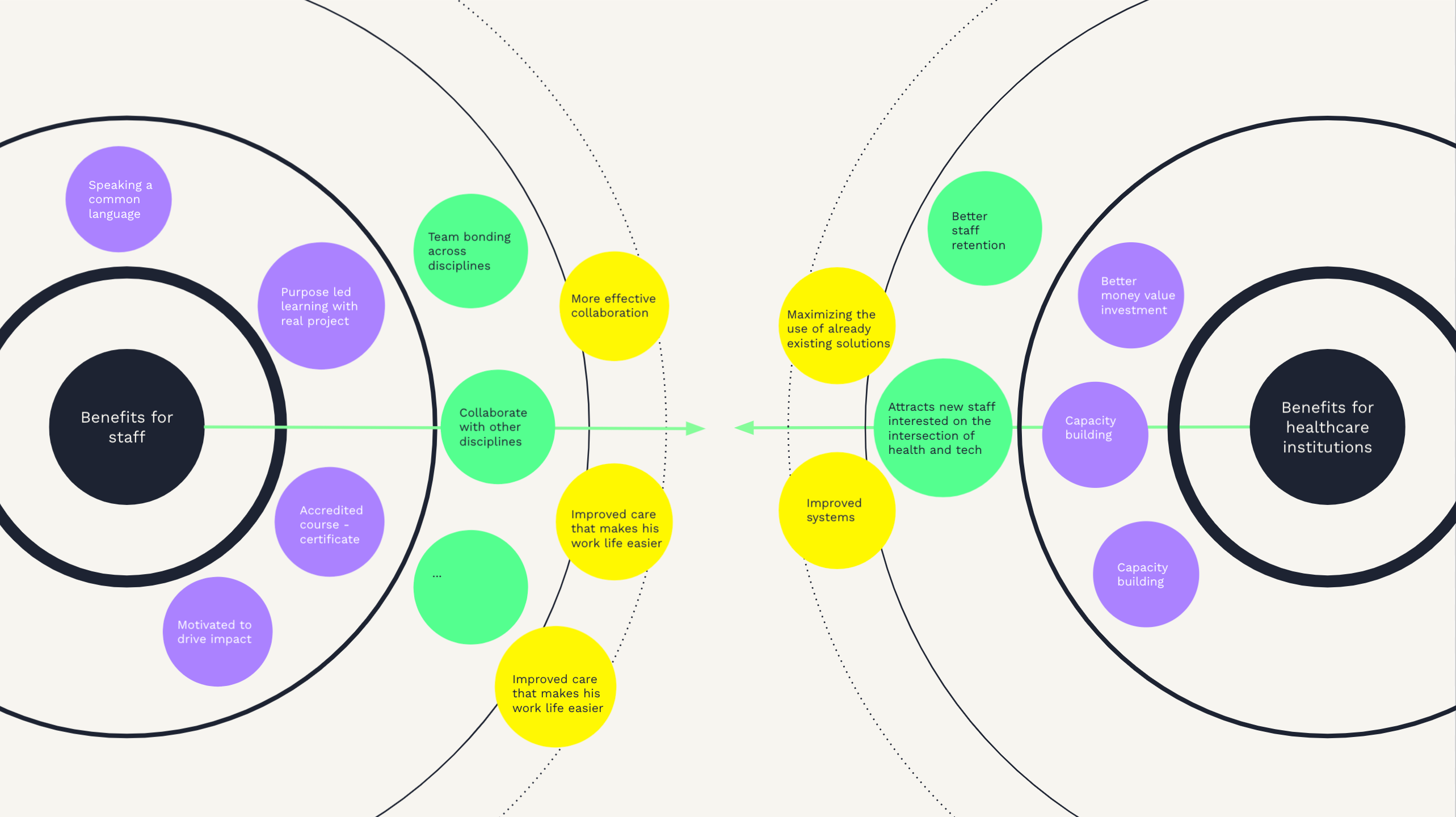Datagym - Distributing data skills in medicine
A course to train mental muscles for innovation in healthcare
The future of healthcare will be technology-driven at its core and data is the ‘material’ that allows pushing this transformation towards higher quality care at scale.
Datagym is a course that educates staff across the board in healthcare to understand why data is important and how they can improve healthcare by making use of it. This is done through a collaborative, multidisciplinary, experiential learning approach in which learners are able to work on real-world projects and expand their horizons.
Context
Healthcare produces data daily in the form of surveys, lab test results, wearables, patient data and more. This data can be used in care, e.g. to monitor patients remotely, diagnose diseases and facilitate internal clinical processes that allow more seamless and faster planning.
The potential of data is enormous, but its use is far from efficient!
At the moment, many healthcare systems are collecting vast amounts of data. The challenge is that the healthcare workforce is not equipped to handle or make good use of it. And this lack of skills is not sufficiently covered by current existing education. All of this impedes a transformation that will be needed to provide quality care at scale in the future.


Research
The problem is, that people are "very much thrown in at the deep end and it’s like the blind leading the blind. They have no idea how to solve the problems and half the time the people have no idea and so they spend a lot of time just finding the right person or the right people within the organization that might be able to help them."
Also, existing courses don’t fulfil workforce requirements to upskill the workforce. Available courses from online providers are too superficial, technical, theoretical and in general, there is no consensus yet in the field as to what are the required skills for healthcare staff. And on top, they don’t educate for a collaborative practice in reality which starts with something as foundational as speaking the same language across different professional backgrounds.


Approach
Through research we've identified 6 core skills that are needed. To enable the workforce across healthcare, meaning to enable clinicians, technologists and admin staff to improve and innovate, using data as building blocks, they need to be data literate and able to read, analyse and interpret data on a level that allows them to collaborate amongst professionals from different disciplines within healthcare and understand each others' professions on a foundational level. This and the ability to deal with ambiguity where there is no clear solution to a problem are essential skills. For this, Datagym aims to develop the needed critical, technical, creative and human-centred skills to understand and work with data as part of their professional practice.


To enable staff across the board to transform healthcare, we aim to provide every healthcare worker with the critical, technical, creative and human-centred skills to understand and work with data as part of their future practice.


Doing a competitor analysis and decomposing + analysing the core structure of existing service propositions helped us to pick valuable aspects of how the learning process should happen and reconstruct a new educational approach.


Concept
Datagym is a new learning approach where clinicians & technologists cross their horizons to innovate in healthcare with data through collaboration and hands-on experience.
Datagym helps staff across the board in healthcare to get a better understanding of why data is important and how they can improve healthcare by making use of it. This is done through a collaborative, multidisciplinary, experiential learning approach in which learners would be able to work on real-world projects and apply learned skills hands-on with the support of mentors.


In the course of 3 months, participants will be led through the Datagym learning approach whilst still being able to pursue their jobs. The course is based on collaboration, multidisciplinarity, hands-on learning, and mentorship.


1 Participants would start with an initial self-assessment that analyses which areas they need to improve on, and will be given the chance to take a foundational preparatory course before jumping into the main project.


2 They will then be put in multidisciplinary teams and follow the double diamond approach in facilitated workshops where they identify and define an existing problem from their work environment using design methods. A two-day ideation session will get them started to think about first ideas and prototype quickly potential solutions.


3 In the final 2 months, they will be provided with online lectures and work more independently, supported by weekly mentoring and learning whilst testing, failing, iterating and refining their idea together in their teams.


Impact

